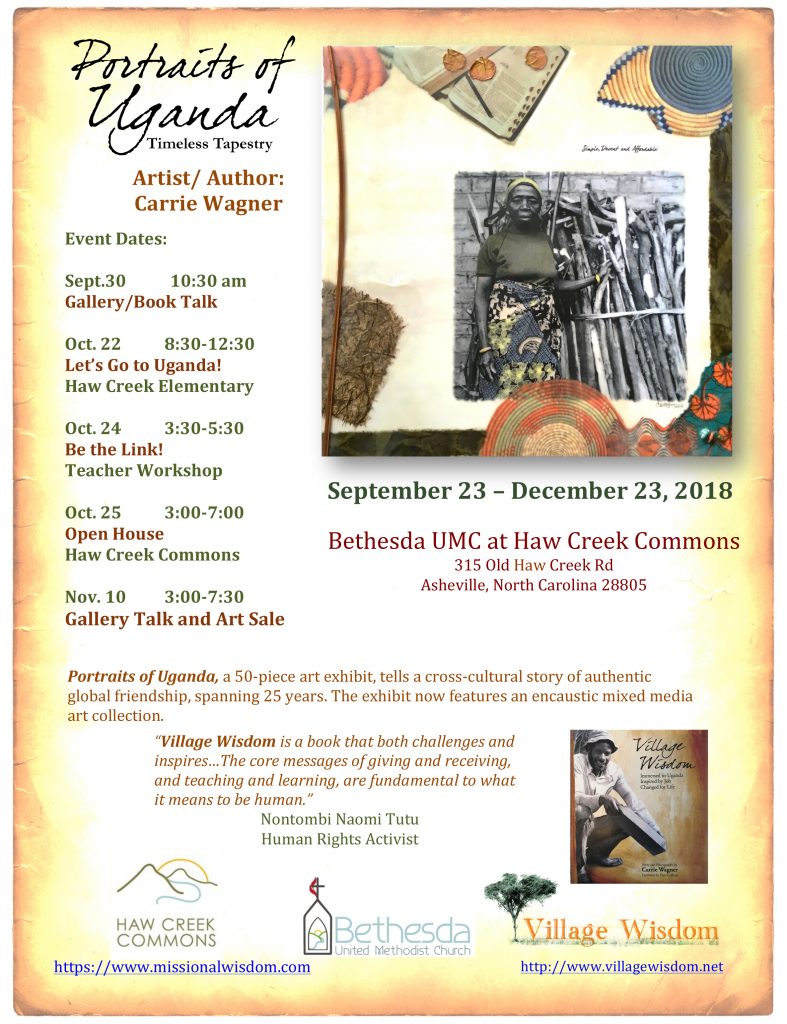
Category: Uncategorized

African Marketplace and Benefit Concert!
Join Us in Asheville, December 9!

Covenant Community Church
11 Rocket Drive, Asheville, NC
5-7 PM African Crafts and Food for Sale
7-9 pm Concert, featuring Kinobe from Uganda and Chris Shebango from Swaziland, and Asheville mixed choir.
Proceeds support school and vocational center in Uganda.
Marketplace: Authentic African crafts and food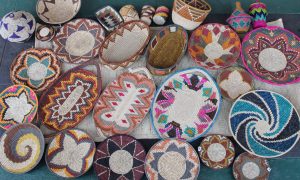
African dinner: $10
Assortment of Baskets, Jewelry and Gifts, individually priced, $8 – $75
Benefit Concert: Music by Kinobe Herbert from Uganda, Chris Shebango from Swaziland, and Asheville mixed choir.
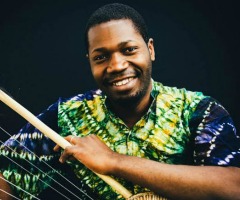
Concert tickets: $10 online, $15 at the door
Kinobe Benefit Concert – September 9th!
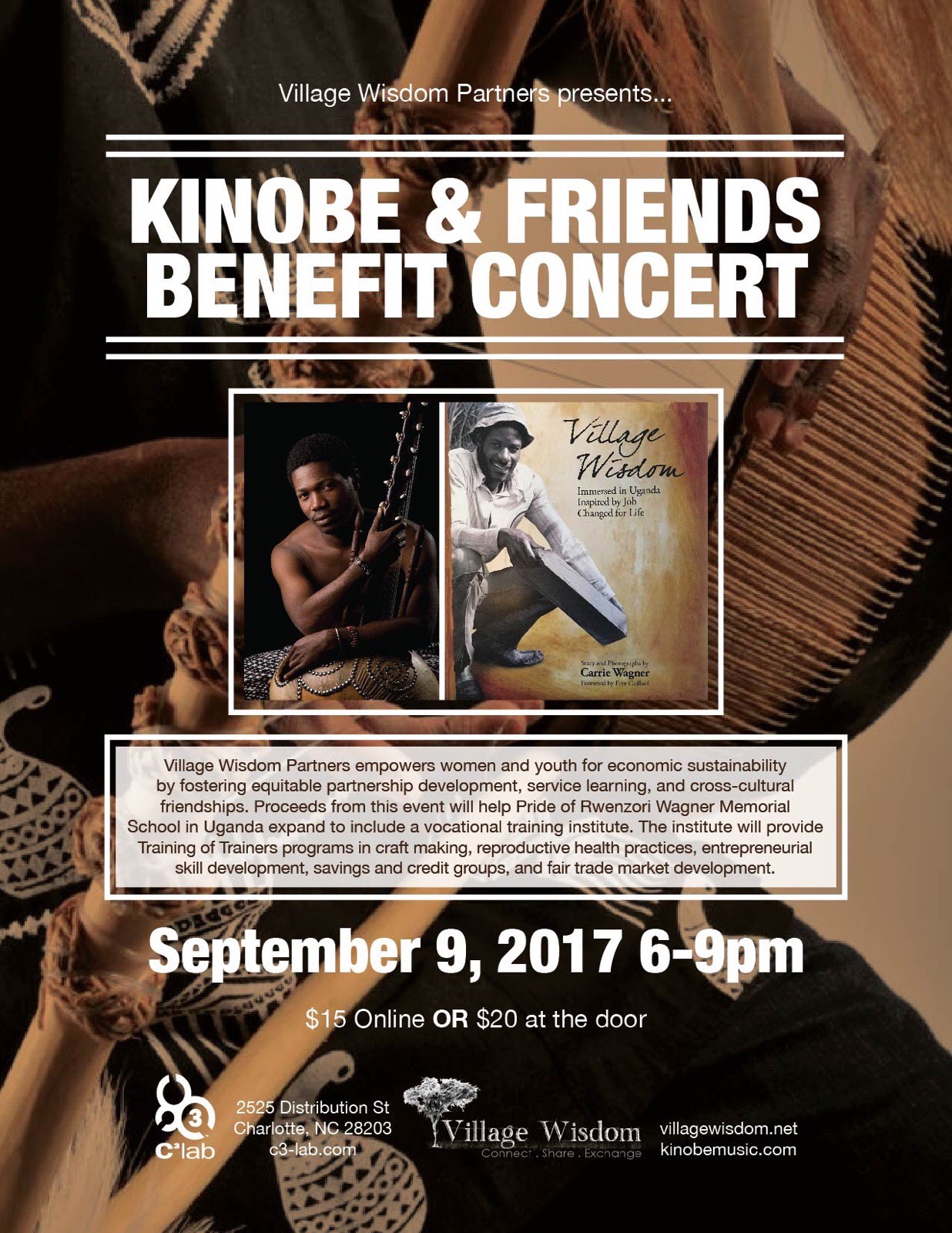 World musician Kinobe Herbert (kinobemusic.com), and author/photographer Carrie Wagner (carriewagner.com) join together to share music and stories from the heart, in the gallery that exhibits Portraits of Uganda, Carrie’s photographs that celebrate 25 years of relationship and ongoing development work in Uganda. Kinobe (chinobay) is a gifted Ugandan musician and philanthropist known for his inspired synthesis of African roots and global fusion. Proceeds from this event will help Pride of Rwenzori Wagner Memorial School expand to include a vocational training institute. The institute will provide Training of Trainers programs in craft making, reproductive health practices, entreprepreneurial skills, savings and credit groups, and fair trade market development.
World musician Kinobe Herbert (kinobemusic.com), and author/photographer Carrie Wagner (carriewagner.com) join together to share music and stories from the heart, in the gallery that exhibits Portraits of Uganda, Carrie’s photographs that celebrate 25 years of relationship and ongoing development work in Uganda. Kinobe (chinobay) is a gifted Ugandan musician and philanthropist known for his inspired synthesis of African roots and global fusion. Proceeds from this event will help Pride of Rwenzori Wagner Memorial School expand to include a vocational training institute. The institute will provide Training of Trainers programs in craft making, reproductive health practices, entreprepreneurial skills, savings and credit groups, and fair trade market development.
Portraits of Uganda in Charlotte!
Join us for 2 events in Charlotte, September 1-23, 2017.
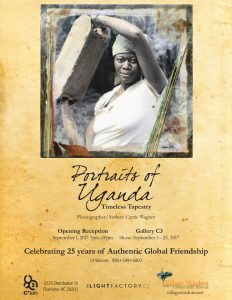
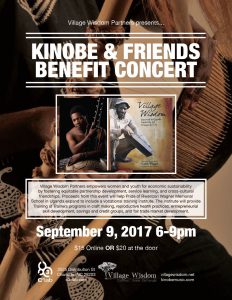
Buy Concert Tickets Here! https://www.eventbrite.com/e/kinobe-benefit-concert-tickets-36972232944?aff=eac2
Women’s Savings and Loan Groups
After an am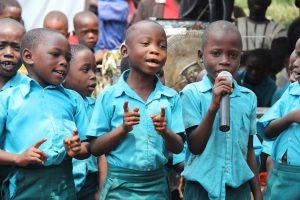 azing, crazy week in Kampala we headed out to the rural Kasese District. Our heads and our hearts were already full with everyone we had met and the incredible work being done by women who would probably consider themselves ordinary Ugandans, but who in fact are pretty extraordinary Ugandans. They are not royalty, they are not politicians, they are not heads of major corporations; they are women quietly following their hearts and dreams and making a difference in the life of their neighbors, and all of us.
azing, crazy week in Kampala we headed out to the rural Kasese District. Our heads and our hearts were already full with everyone we had met and the incredible work being done by women who would probably consider themselves ordinary Ugandans, but who in fact are pretty extraordinary Ugandans. They are not royalty, they are not politicians, they are not heads of major corporations; they are women quietly following their hearts and dreams and making a difference in the life of their neighbors, and all of us.
As we made our way into the countryside the pace became 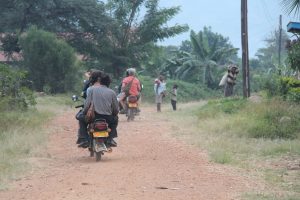 slower and everything was green and lush. On the way we began to learn simple greetings in the native Lukonjo language; many of the children and men speak English but the women do not. We are women who were on a trip to learn from women in Uganda; the ability to communicate was vitally important to us. As soon as we arrived in Ibanda we were warmly welcomed by the staff and children of the Pride of Rwenzori Wagner Memorial School. It was a day of celebration for us all: six years of the school’s growth and Carrie reconnecting with friends. Carrie, Molly, Mandy, and I were invited to sing our national anthem as our flag was raised. There are no words to describe how we felt.
slower and everything was green and lush. On the way we began to learn simple greetings in the native Lukonjo language; many of the children and men speak English but the women do not. We are women who were on a trip to learn from women in Uganda; the ability to communicate was vitally important to us. As soon as we arrived in Ibanda we were warmly welcomed by the staff and children of the Pride of Rwenzori Wagner Memorial School. It was a day of celebration for us all: six years of the school’s growth and Carrie reconnecting with friends. Carrie, Molly, Mandy, and I were invited to sing our national anthem as our flag was raised. There are no words to describe how we felt.
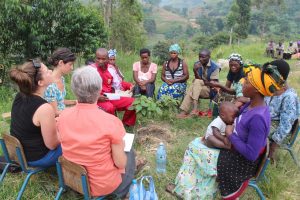 Early the next morning we all met in the village center to ride up the mountain on the backs of boda-bodas (small motorcycles) to meet with women and a few men who are members of craft and coffee cooperatives. The first day we met with eight groups of between 8-10 members each. We were interested in how they are self-sustaining, and how we could potentially help in the future; this was a fact-finding trip and we knew we definitely did not have facts, or answers for them. What we discovered, I think, amazed us: every group has their own micro savings and loan system, some have been in place for decades. Each member pays an initial dues fee to join the group and they pay a pre-set amount on a regular basis. Loans are provided at 3% interest for a term of 3 months. If a member becomes sick or injured and cannot repay the loan on time the interest rate is dropped to 0% and the term is extended; clearly no usury here! It is one of the beautiful ways villages are truly living in community. Members and neighbors look out for each other and no one’s disadvantage becomes another’s leg up.
Early the next morning we all met in the village center to ride up the mountain on the backs of boda-bodas (small motorcycles) to meet with women and a few men who are members of craft and coffee cooperatives. The first day we met with eight groups of between 8-10 members each. We were interested in how they are self-sustaining, and how we could potentially help in the future; this was a fact-finding trip and we knew we definitely did not have facts, or answers for them. What we discovered, I think, amazed us: every group has their own micro savings and loan system, some have been in place for decades. Each member pays an initial dues fee to join the group and they pay a pre-set amount on a regular basis. Loans are provided at 3% interest for a term of 3 months. If a member becomes sick or injured and cannot repay the loan on time the interest rate is dropped to 0% and the term is extended; clearly no usury here! It is one of the beautiful ways villages are truly living in community. Members and neighbors look out for each other and no one’s disadvantage becomes another’s leg up.
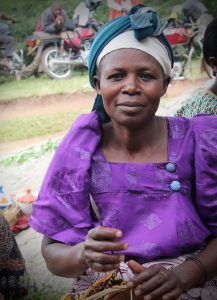 We were blessed to meet with even more groups in the villages of Ibanda and Maliba, women or their representatives totaling about 1800 individuals on the following days. Again, each group has a micro savings and loan system. Our hosts translated for us. The women we met are passionate about being able to keep their children in school, especially their daughters. They have learned that educating a daughter leads to a better life for everyone in the village. Women who weave were taught the skill by their mothers and grandmothers and they are passing the skills to their daughters and granddaughters. We learned that seamstresses typically rent their sewing machines and that roughly 3 months rent of a single machine could purchase the machine. They are entrepreneurs, business women, neighbors, and friends. They have hopes and dreams for the future and ideas about how to get there. We are blessed to have been in their presence, and look forward to a future of learning and sharing with these incredible women.
We were blessed to meet with even more groups in the villages of Ibanda and Maliba, women or their representatives totaling about 1800 individuals on the following days. Again, each group has a micro savings and loan system. Our hosts translated for us. The women we met are passionate about being able to keep their children in school, especially their daughters. They have learned that educating a daughter leads to a better life for everyone in the village. Women who weave were taught the skill by their mothers and grandmothers and they are passing the skills to their daughters and granddaughters. We learned that seamstresses typically rent their sewing machines and that roughly 3 months rent of a single machine could purchase the machine. They are entrepreneurs, business women, neighbors, and friends. They have hopes and dreams for the future and ideas about how to get there. We are blessed to have been in their presence, and look forward to a future of learning and sharing with these incredible women.
Wasinga (thank you).
Visiting and Networking with Organizations in Kampala
In our first few days in Kampala we had the opportunity to visit a Kiwuwa Foundation project based in Maganjo, an outlying slum of Kampala. The Kiwuwa Foundation runs a small but promising program for young school children who have dropped out of government schools for various reasons. James Kiwuwa explained that the “Catch Up Project” aims to get children back to their grade level with a specialized curriculum developed by Kiwuwa Foundation staff. Presently there is one section of the school that is finished and provides a learning space for the children. There are two additional sections of the structure on the ground floor ready for expansion when funds are in place with plans for a 2nd story as well. The “Catch Up Project” is just one of the community development project of the Kiwuwa Foundation.
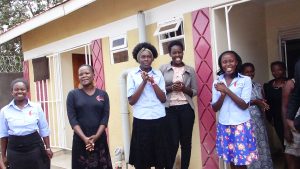
On the same day we visited an organization called Girl Up Initiative Uganda, based in a slum in the area of Luzira. We were warmly greeted with a welcome song and dance performed by the entire staff. Monica, the Executive Director and Co-Founder, and team of 15 staff members invited us into their small office space to tell us more about their incredible organization. Girl Up has several programs that empower and encourage young women to be confident self advocates. The Adolescent Girls Program empowers primary school girls to stay in school and become leaders through a yearlong life skills and sexual health training program. This program performs ten trainings a year in three schools with eighty girls in each school and educates them on sexual reproduction, self esteem, sexuality, and menstruation. Girls learn crafts skills to sew reusable sanitary pads for personal use and to sell as an income generating project. Menstruation is an issue in many developing countries because it isolates girls and prevents them from attending school – girls miss weeks of school each year which limits their success. Girl Up Initiative addresses menstruation isolation as a women and girls education issue.
Ni-Yetu Youth Program is another program of Girl Up that equips both boys and girls with the correct knowledge, attitude and skills to reduce gender based violence and improve sexual and reproductive health outcomes. Thirty peer educators compiled of women, men, and individuals with disabilities reach out to local adolescents in Kampala schools to act out community issue in a Forum Theater process.
In December, Girl Up developed Mazuri Designs, the economic development arm of the organization. Mazuri Designs employs three seamstresses and trains out of school girls in tailoring skills. The workshop operates according to Fair Trade principles and the sale of products help to generate income, pay for workshop supplies and materials and increase presence of the organization. Girl Up Uganda is an incredibly well organized program and we were inspired by all it has accomplished since it started in 2014.
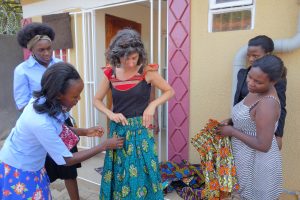
Mazuri Designs Ugandan Seamstress Update
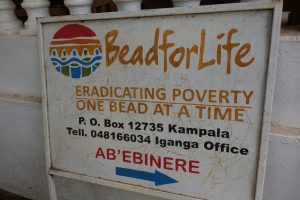
The following morning we traveled to an eastern part of the city to a leafy green area called Bugolobi. The main office of Bead for Life is located here and we were welcomed in for a meeting with the staff. Program Managers, Evelyn and Phoebe, talked with us about the history and various programs of the twelve year old organization. Bead for Life is a social enterprise NGO founded through the initiative of US social workers after they discovered women making jewelry out of recycled paper beads. Founders recruited the women from the slum to train others and gathered 100 women to be trained. The goal was to help women learn craft and business skills and use the bead making as a way to start other businesses. Through the years over 700 women have been trained and moved on to start their own businesses. In 2012 BFL and Habitat for Humanity partnered to create Friendship Village, an 18 acre plot with 30 homes. In a few short years all the women in the villages have earned enough money to pay for the title of their individual land and wire in electricity.
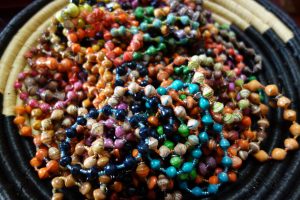
Bead for Life also has a Street Business Schools for women to learn business skills. The six month program trains women in entrepreneurial skills to help them build better lives. The free training program has provided opportunity to over 16 groups of 40 women with a focus on business skills training that can be applied in community context. Bead for Life has found that 80% of women go on to start their own businesses and their incomes grow around 50%.
The newest initiative of Bead for Life is the Ignite One Million project. Through a series of Imagine Workshops, Bead for Life will train members of groups from other areas of Uganda and other countries around the world. The goal during the week long program is to train a network of trainers that can nurture entrepreneurial growth within their own communities. The program is an avenue in which Bead for Life shares their unique curriculum and methodologies with other organizations in Uganda and in other countries. A very worthwhile endeavor to create broad change through a long history of successes.
On additional visits to the capital city later in the month we had the opportunity to visit another impactful organization that is making change through fair trade initiatives.
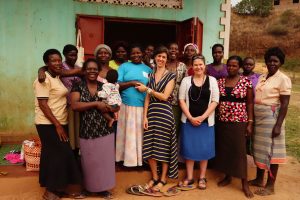
Fashion & Compassion is a US based non-profit social enterprise organization that works with artisans in developing countries to produce beautiful handcrafted jewelry and personal accessories. The project in Uganda is based in Acholi Quarters, a slum inhabited by the Acholi people of Northern Uganda. During the reign of Idi Amin, the Acholi people fled to the capital city for safety but had limited opportunity to work, farm or create livelihoods. Many individuals were forced to find work in the local quarry which proved to be dangerous and laborious work for pennies a day. Fashion & Compassion recruited 18 women to be trained in craft production and entrepreneurial skills, giving them skills to produce products for the US market and their local community. Soon these 18 women will graduate from the program to follow their independent projects and allow opportunity for a new class of women in need of empowerment. Our visit to the Fashion & Compassion artisans in Acholi was an emotional experience; we made dear friends, were lifted up in song, and witnessed the opportunity that fair trade brings to women in marginalized situations.
Building Partnerships
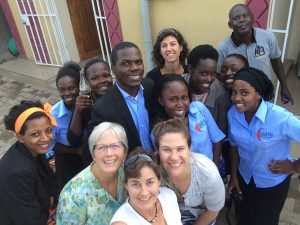
When the Village Wisdom team set out on our 2016 trip to Uganda, we went with open hearts, open minds and hopeful attitudes. We also went with goals for exploring potential partners and pathways for fair trade development. Our team, Carrie Wagner, Laurie Morgan, Molly Dingledine, and Mandy Broderick, came together in partnership with common interests and purposes, and with a broad variety of expertise. The diverse experience and skill sets that each partner brought to the table, coupled with our diligent planning, catapulted all trip endeavors.
The outcomes of our trip far exceeded our hopes and expectations. Why? Because we are building upon a strong foundation of long-term relationships that were formed and nurtured upon shared values. Additionally, the Village Wisdom team identified core values that would guide our approach and activities on the trip. These values include authentic global connection, equitable relationships, story sharing, ethical consumerism, and environmentally responsible practices.
For a year leading up to the trip, we did research on organizations and development approaches that align with our philosophies, and found groups that have demonstrated success in programs for participatory learning and leadership, empowerment, and community-based problem solving. Our homework paid off, as we were able to hit the ground running.
Authentic partnership development is not to be taken lightly. It requires commitment to common purpose, investment of resources, accountability, and continual evaluation of progress, impact, and effectiveness.
Partnership development is also a long-term process, and partners have to be committed to that long haul. As the Village Wisdom team speaks of partners, we are inclusive of different types of partner relationships. We are looking at business partners for fair trade; we are looking at organizational partners that want to improve the lives of vulnerable women and youth; and we are looking for individuals who want to be part of a global culture shift that embraces the principles of fair trade and triple bottom line business practices.
In just a few weeks on the ground in Uganda, we met with several organizations in Kampala, Fort Portal, and Kasese District. We re-connected with many friends from 25 years ago, who had worked in partnership with Bob and Carrie Wagner and Habitat for Humanity International. Over a 3-year period, Bob and Carrie worked with local leaders in Ibanda, Maliba and Kyanya to develop a sustainable house-building project. Their community groups approach, based on the Grameen Bank model, has served the communities well. During our time in the Rwenzori Mountains on this trip, we met with numerous savings and credit groups that are using their cooperative structures to support many entrepreneurial endeavors. Some are large coffee cooperatives, and others are craft production groups.
The Village Wisdom team was so inspired by the energy and productivity of people in the rural areas. But we were also moved to continue seeking support for progress and improvement of living conditions. This is another opportunity for partnership development. We will embark upon connecting Rotary clubs, churches and other humanitarian organizations to support the development of vocational training programs, and entrepreneurial skills for the region. This resource exploration will take time, and we are committed to taking that time to make the right connections for sustainable development.
We welcome your interest and insights!
Back Home with Stories to Share!
Carrie Wagner, Mandy Broderick, Molly Dingledine, and Laurie Morgan travelled to Uganda in July, 2016 to work directly with artisans and craft cooperatives. They explored and shared best practices for fair trade, entrepreneurship, and economic development strategies for sustaining the livelihood of vulnerable women and children. The following blog posts will tell the stories from their wonderful and fruitful trip.
We’re Off to Uganda!
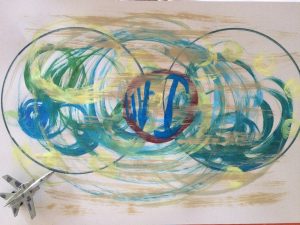
I watched the sunrise in Atlanta this morning, and I board my first flight at 2:30 this afternoon. After 22 hours of travel, I will see the sun set in Africa. We are off for a big adventure! Look out Uganda – here come Carrie, Mandy, Molly, and Laurie.
Countdown for Departure
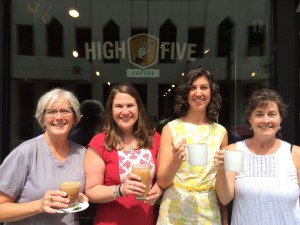

Two weeks from today, we will have arrived in Kampala, and will be acclimating to a different time and culture. Our long planned trip to Uganda is finally upon us and our daily thoughts are consumed with the logistics of international travel. As is usual and quite normal for global trips, the village wisdom team has been busy planning our itinerary – what we will do, who we will meet, what our goals and objectives are…We are American travelers with embedded cultural values and behaviors that we are sometimes and other times not cognizant of.
I pray that over the next two weeks we will shift our focus from doing to being; from planning to experiencing; from talking to listening; and from explicit to implicit motivation and learning. Our approach to cross-cultural work and relationships is key to the sustainability of both.
We welcome your thoughts and inquiries about this initial Village Wisdom Venture. Thank you for your interest!
